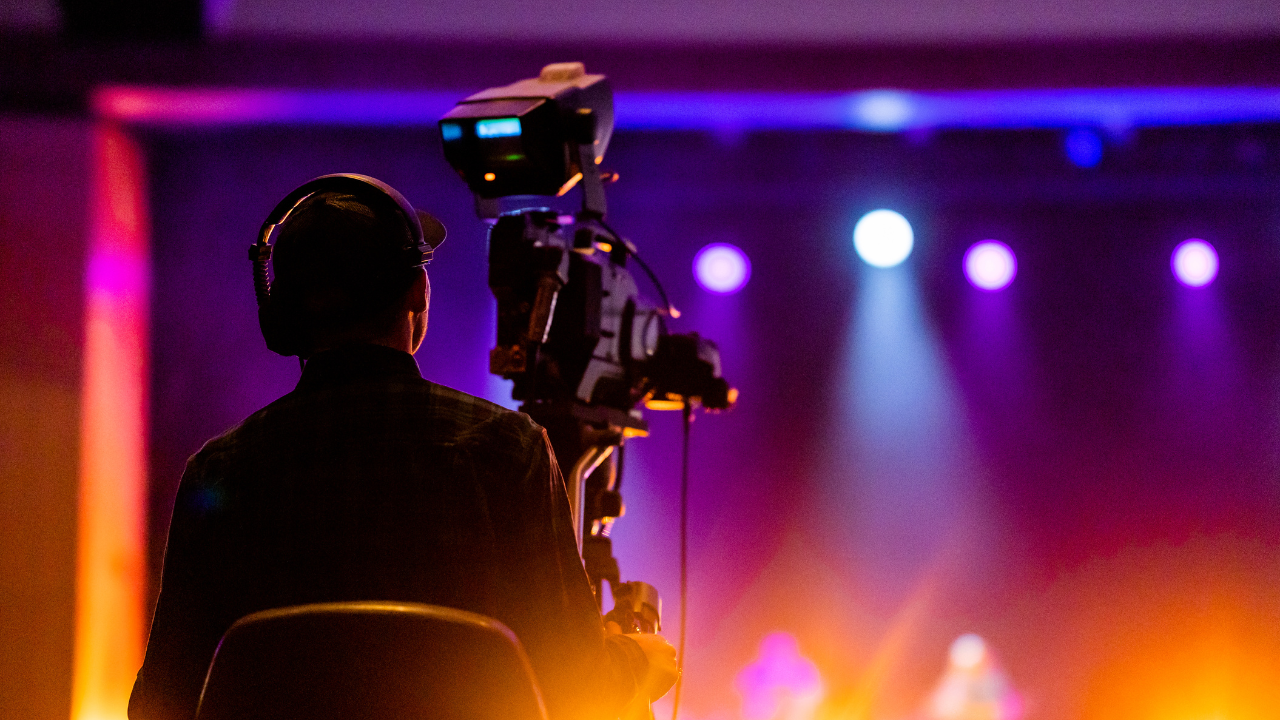
Love Creating Content on TikTok? This might be the right career for you.
An interview with Ryan Stone, Creative & Marketing Director at Lambda Films
Q: We all spend a lot of time watching video content, but what exactly is the field of video production?
If I were to define the industry and what I do specifically, it's creating video content that helps businesses sell products, promote services, or raise brand awareness. There are many types of formats: promotional videos, product videos, recruitment videos, animations, training videos, e-learning, and more. It's all about helping people engage with a brand.
Q: Tell us a bit about your journey and how the industry has changed in the last two decades.
When I started my company after university, there was a significant technological shift happening. Facebook and YouTube were emerging as major platforms for business communication and marketing.
Coming out of university, the timing was perfect for me. I hadn't formally studied filmmaking in school, so I learned it on my own. My early films weren't perfect, but they fit well on online platforms, especially during a time when viewers were more accepting of basic video content on Facebook and YouTube. Seizing this opportunity, I started a business that grew alongside the rise of online video marketing and various social platforms.
Today, Lambda Films is a leading video production and animation agency in the UK. We produce online videos, brand videos, and commercials for businesses and organizations.
I’d say we're currently experiencing another technological shift that is changing the industry. Young people can now easily enter this field with powerful 4K cameras and editing software right in their pockets. They’ve grown up creating content as a means of communicating with each other. This is their medium.
Plus, the internet has a huge amount of resources. Creative software companies even partner with universities to provide free or cheap access. With many using video to communicate on social platforms, people are getting more creative, editing, and picking up camera tricks. Young creators are continuously producing engaging, short content for social media. If they love it, it’s now very easy to make the transition from hobby to career.
Q: Does your company handle scriptwriting and casting actors? Is that all part of video production?
Yes, we brand ourselves as a full-service production company. Filmmaking consists of various components, which are organized into three main stages:
- Pre-production: This includes scripting, storyboarding, casting, wardrobe, and the like.
- Production: This is the filming phase. This is when you need directors, producers, camera people, directors of photography, and lighting technicians. Additionally, there are entry-level positions like assistants and runners, which are great starting points for young people.
- Post-production: Here, we work on editing — piecing the video together, color grading, adding sound effects, and incorporating music.
While at Lamda Films, we cover all these stages in-house, they also exist as freelance positions. Some companies may choose to focus on just one or two stages and specialize in them.
Q: If a young person is trying to figure out their path and they're drawn to content creation or just love being in that world, it seems there could be around 20 different roles they might consider. Is that right?
Absolutely. Many young people who are creating content on social media, for example, might already be handling multiple roles. Even if they aren't writing out a full script, they're probably crafting the idea. They're filming, editing, and possibly adding music. So, they're naturally taking on several tasks. This experience gives them a sense of what each role entails. They might discover a preference for one over the others, choosing to pursue it professionally.
In smaller companies, you often get to do a number of those disciplines. It's a great approach for those who enjoy that type of environment.
Q: Can you describe the typical person in your industry in terms of age, education, background, or any other aspects?
It's difficult to define, mainly because the industry has developed so quickly. You've got many from the older generation, still in roles of power, such as directors or camera operators. However, there's a noticeable shift with young people coming in with agile production gear and fresh creative ideas. The industry is quite diverse.
If I had to give a more specific answer, I'd say there are a lot of young creatives, probably in their late twenties to mid-thirties, leading some of the most interesting and successful companies today. They are supported by an absolute army of young people coming out of colleges and universities, with experience they've gained producing on their own.
Q: We often discuss the value of higher education in different careers. When you're hiring, how important is it if a candidate went to a top-tier university versus someone who's been making content for social since they were ten?
When I talk to students and universities, I'm very passionate about sharing that educational background isn't the deciding factor for us. Of course, we expect good communication skills, both written and verbal, and a sense of organization. However, during the hiring process, we barely look at the CV. If we do, it's to skim through their experience briefly. We look even less at where they went to school and what their grades were. Our primary focus is on what they've produced themselves.
I always tell students that with the vast resources available online and the tools right in our pockets, anyone passionate should be creating every day. When you come across someone doing just that, you know they'd make a great fit because they've been demonstrating their passion consistently.
Q: What are the career trajectories in your field? Do people generally stick around or move to Hollywood?
It depends on the individual’s goals. In our company, many employees stay. They want a stable, positive environment where they can do what they love and be treated well. As a testament, we just celebrated the ten-year anniversary of our first employee.
We consider ourselves a mid-tier company, specializing in brand videos and commercials. However, there are bigger companies that work with ad agencies to produce high-end TV commercials, often involving sophisticated visual effects and significant budgets.
If you begin in a smaller production setting and steadily move up, the higher you climb, the more likely you'll need to specialize in something like lighting or becoming a director of photography.
For those interested in actual feature filmmaking, the UK offers a lot of opportunities for short film production. If you're starting in the UK, you need to be recognized on the British scene before moving over to make American films.
In the US, many directors find their roots in music video production. Starting with production companies and then gradually working your way up can lead to feature filmmaking with major studios. At that level, you have to specialize. You've got to be doing one thing and doing it better than 90% of other people. It's essential to be certain that's the path you want to take.
Q: Given how popular video content is now, is the industry growing quickly? How is this impacting your business?
The industry is favoring the young, new talent at the moment. The barrier to entry for young creatives has lowered significantly, making it a promising field for those just out of school as long as they create on their own time and are really passionate about it.
Even though the industry is growing, it's not as simple as saying our business is booming, because, at the same time, budgets have tightened, and customers want and need lots of content.
For example, in the past, a one four-minute video might have been enough. Now, companies want a main video and several shorter ones for different places on social media.
Q: How is AI impacting video production?
AI is certainly changing video production but I think for the better. We're integrating AI into our process as much as possible. For example, ChatGPT helps us with research, scriptwriting, and brainstorming ideas. That saves a lot of time.
Midjourney, a text-to-image generator, allows us to create concept art. Before, if we had a concept for a video, we'd typically just write it down for our clients. But with Midjourney, we can transform those written ideas into visual concept art.
There are also tools out there that generate voiceovers. We don't use these for final products, but they're helpful for getting a feel of a script, matching it with storyboards, and understanding its pacing and emotional impact points.
In the filming stage, AI doesn’t play as much of a role, but it comes back in during editing. AI tools help transcribe lengthy interviews, clean up audio, and even replace or adjust video backgrounds. Some new tools I've been trying are truly powerful and can transform the way we approach projects.
There's a growing trend in producing videos using only AI. It's still early days, but you can take an image and have AI animate it. It's not as polished as traditional methods but offers potential for the future.
A recent Marvel TV show, Secret Invasion, used AI to create its title sequence. What traditionally could have cost hundreds of thousands of pounds to a company and creatives now can be done by one person at a computer.
Q: Do you have any advice for the next generation entering the video production industry?
My main piece of advice is to build a portfolio and establish a social presence. Just create as much as possible in your free time. With the rise of AI tools, it's crucial for newcomers to familiarize themselves with these technologies. There will be a point when industry veterans will rely on the younger generation's proficiency with these tools.
As for specific tools that might have a lasting impact, I'd highlight Runway. It's a platform containing multiple tools primarily focused on video. It's a good place for newcomers to start honing their skills.









